Neurologic Occupational Therapy Fellowship
Mary Free Bed’s Neurologic Occupational Therapy Fellowship provides an advanced post-professional clinical training for occupational therapists, designed to further develop expertise through exposure to education, research and multidisciplinary clinical environments.
Our fellowship program offers unique learning experiences. Fellows will:
- Complete three inpatient clinical rotations with patients who have experienced brain injury, spinal cord injury and stroke.
- Complete one outpatient clinical rotation working with patients with neurologic conditions.
- Partner with Western Michigan University as an adjunct faculty member and volunteer in WMU’s Neuro Rehab Clinic.
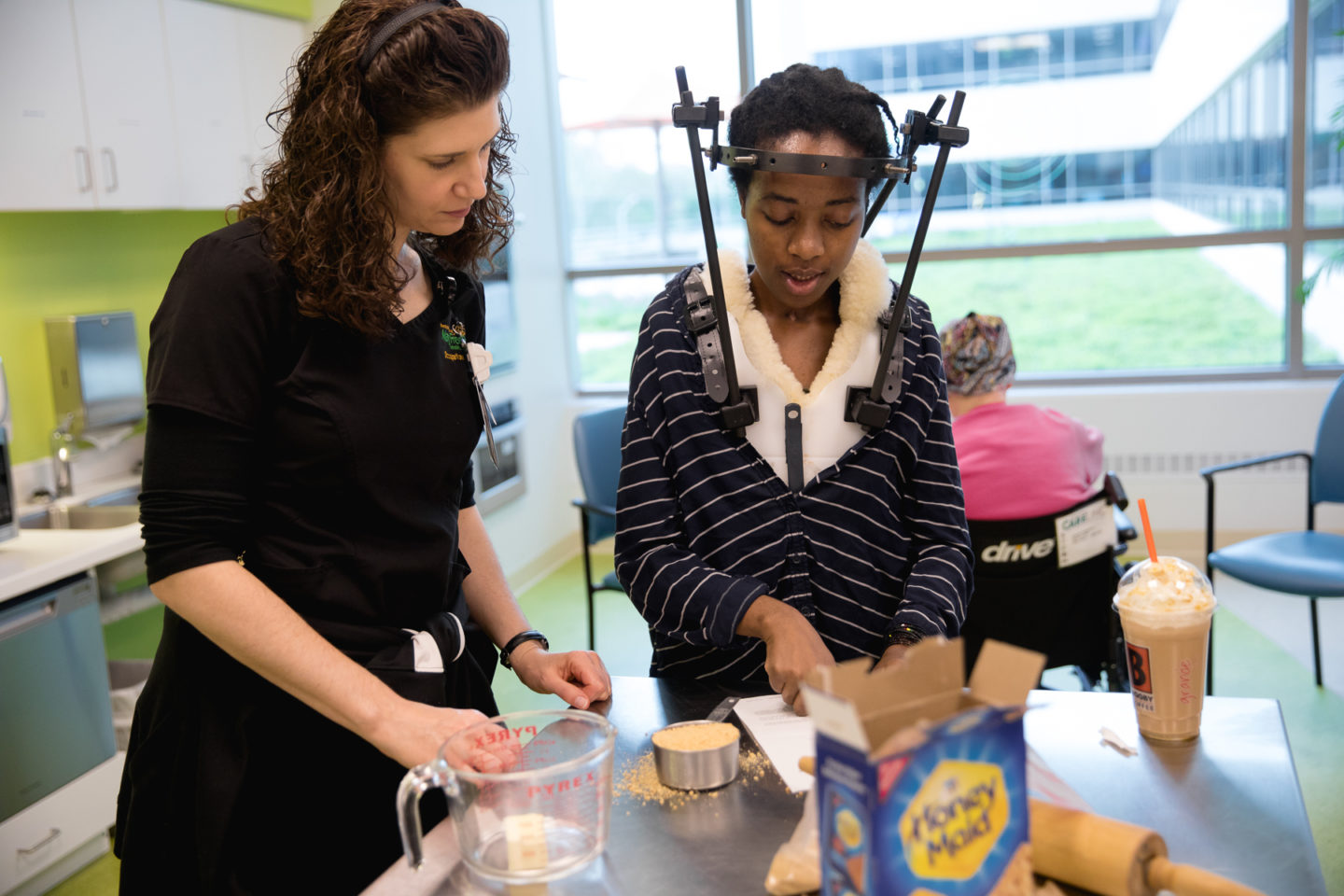
The mission of our Neurologic Occupational Therapy Fellowship is to provide advanced clinical training in a multi-faceted, multi-disciplinary environment. Fellows will participate in a combination of expert mentorship, didactic teachings and education, and dynamic clinical experience. Fellows will:
- Demonstrate advanced professional skills to support and facilitate occupational participation and performance.
- Restore hope and freedom through rehabilitation and achieve clinical excellence across the neurologic rehabilitation specialty.
- Work closely with an interdisciplinary team, using evidence-based research in treatment design, application and modification with a variety of neurological disorders.
- Develop the ability to share their skilled clinical knowledge with students, volunteers, patients and their families, and peers to further the occupational therapy profession while exuding the highest professional and ethical standards.
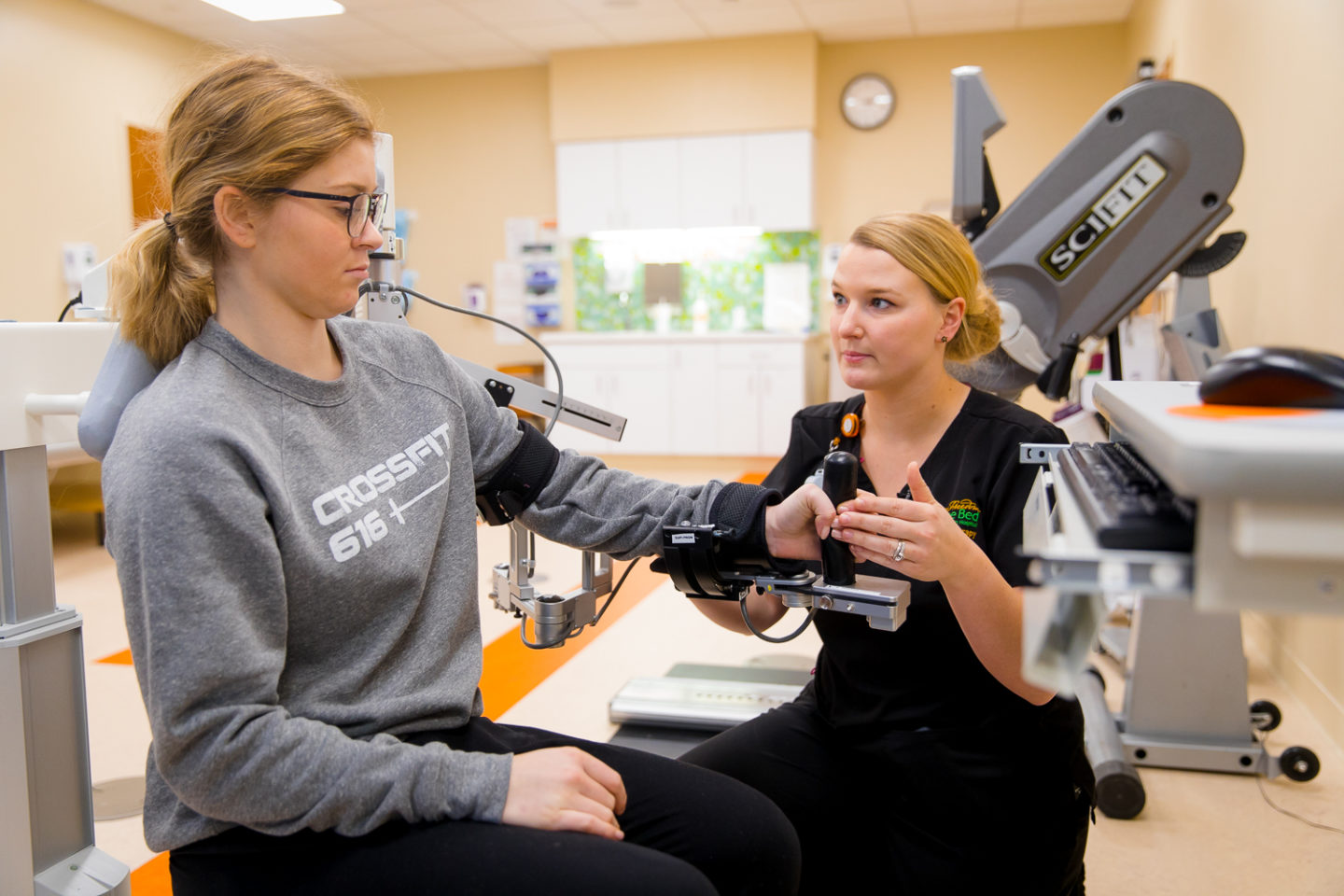
Learn more
Check out our Frequently Asked Questions Document here.
Please explore the categories below for program details.
Application questions: Email recruitment@maryfreebed.com.
Program-specific questions: Email Stephanie DeKryger at OTfellowship@maryfreebed.com.
General residency/fellowship questions: Email Therapy.ResFel@maryfreebed.com.
Clinical Curriculum
Clinical time will be split between our inpatient hospital and outpatient therapy center, enabling fellows to enhance their clinical skills in treatment of patients with a range of diagnoses.
- Inpatient clinical rotations will include time with the brain injury, spinal cord injury and stroke teams.
- The outpatient rotation includes work with patients with neurologic diagnoses, such as post-concussion, post-CVA and spinal cord injury.
- While in each specialty area, the fellow will build clinical reasoning skills enhanced through mentoring time with an expert neurologic therapist.
Supplemental professional development activities include clinical observation in multiple specialty clinics (Post-Concussion, Muscular Dystrophy, ALS), observation of many specialty rehabilitation services and additional learning opportunities across disciplines. Examples include:
- OrthoSEAT
- Assistive technology
- Orthotics & Prosthetics + Bionics
- Modified barium swallow study
- Hand therapy
- Work hardening
- Pain Rehabilitation Program
- Music therapy
- Driver rehabilitation
- Interdisciplinary rounds and education events
- In-services for new, up-and-coming equipment and technologies.
The fellow will lead monthly journal clubs to engage the rehabilitation team in evidence-based practice and case reviews to explore occupational profiling, clinical decision-making and application of research into a current clinical case in order to achieve the best possible occupational outcomes.
Didactics
The curriculum will incorporate the Fellowship Program Learning Objectives (FPLO) as well as the American Occupational Therapy Association Standards of Continuing Competence.
Didactic information will be presented to the fellow in a variety of formats — webinars, self-guided modules, directed readings, hands-on practice, discussion with mentors and more — to impart specialty-specific knowledge. Fellows will be supported in continuing education opportunities and required to share information learned with the team.
Dedicated time will be spent engaging in a scientific inquiry project with a Western Michigan University faculty mentor and collaborator focused on an area of the fellow’s interest.
Fellows will have the opportunity to gain teaching experience working in WMU’s Department of Occupational Therapy neurologic lab and classroom settings. Fellows also will spend time overseeing WMU OTD students at the university’s Neuro Rehab Clinic, serving patients with neurologic diagnoses, including stroke, brain injury, spinal cord injury, dementia and Parkinson’s disease.
Faculty
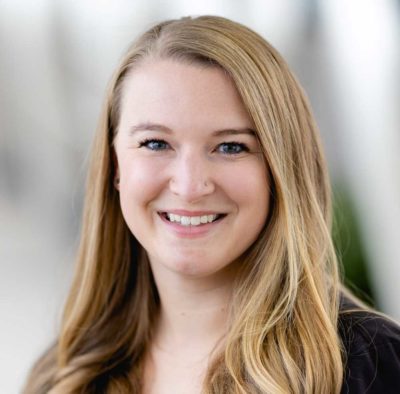 Stephanie DeKryger, MS, OTR/L, BCPR
Stephanie DeKryger, MS, OTR/L, BCPR
Fellowship coordinator, Stroke/Amputee Team mentor (inpatient)
- Board Certified in Physical Rehabilitation
- M.S., Western Michigan University; B.S. Health and Human Sciences, Western Michigan University
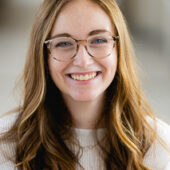
Selena McCray, MSOT, OTRL, CBIS
Brain Injury mentor (inpatient)
- MSOT, Saginaw Valley State University; BS Rehabilitation Medicine, Saginaw Valley State University.
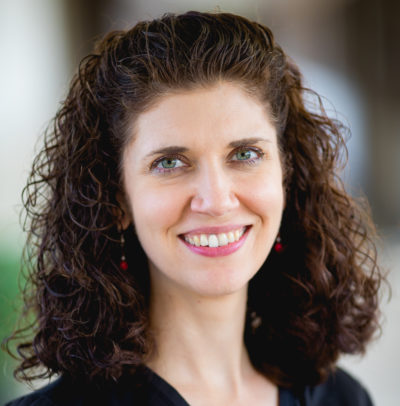 Amy Haroff, MA, OTR/L
Amy Haroff, MA, OTR/L
Outpatient mentor
- Outpatient Spinal Cord Injury Team leader
- MA in TESOL, Cornerstone University; BS Occupational Therapy, Eastern Michigan University
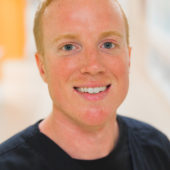 Riley McCartney, MS, OTR/L
Riley McCartney, MS, OTR/L
Spinal Cord Injury mentor (inpatient)
- MSOT, Grand Valley State University; BS Kinesiology, Michigan State University
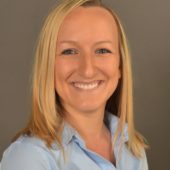
Holly Grieves, OTD, OTRL
Western Michigan University faculty/research mentor
- O.T.D., Texas Woman’s University; M.S., Western Michigan University; B.S., Western Michigan University; A.A.S., Grand Rapids Community College
Sara Clark, MS, OTRL
Western Michigan University faculty/research mentor
- M.S., Washington University; B.S., Washington University
Technologies
- Hocoma Armeo Spring
- Restorative Therapies RTi 300
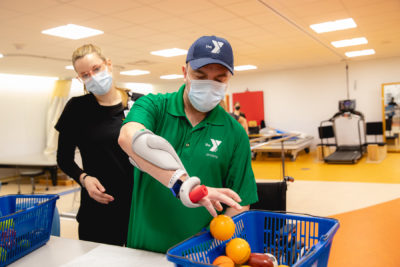
- Bionik InMotion ARM robot
- Bioness H200
- ReoGo
- Saebo Mobile Arm Support
- Saebo ReJoyce
- Biofeedback
- Simulator for driving
- iLimb for upper extremity amputees
- Neuro-sensory motor integration
- MediTouch ArmTutor
- 3-D printer
Job Details
The fellow will have full-time status as a Mary Free Bed employee, which includes full-time benefits. The fellow also will be appointed part-time faculty at Western Michigan University, which includes access to university resources.
Tuition: $200 for additional learning
Requirements:
- Effective communication skills
- Strong performance during clinical (educational) experiences
- Excellent letters of recommendation
Expectations:
- Value and contribute to the occupational therapy profession and the health care community by providing specialized clinical care, evidence-based practice, teaching, leadership and scholarship.
- Integrate advanced patient-centered clinical practice and interdisciplinary team-based collaborative practice, utilizing a theoretical knowledge base in neurological science.
- Engage in and complete a curriculum for post professional learning with a strong focus on evidence-based occupational therapy practice.
Eligibility
The applicant must be an occupational therapist or in their final year of an occupational therapy program accredited by the ACOTE. Applicants must have obtained State of Michigan licensure prior to beginning the fellowship. Fellows must be a member of the AOTA and maintain a current CPR/AED certification.
Want to apply?
Application window open now! Applications are due February 28, 2025 for the 2025 – 2026 fellowship year. Interviews will be held in early March. Please submit your application following the guidelines here.
Program Goals
Goal 1: Graduate fellows with post-professional learning in the neurologic occupational therapy, who can integrate advanced, patient-centered clinical practice and interdisciplinary team-based collaborative practice with a theoretical knowledge base in neurologic rehabilitation to promote improved occupational health and participation of individuals they serve.
Goal 2: To develop advanced trained clinicians who will provide high quality, ethical, evidence-based clinical services to improve the occupation-based outcomes of the individuals served.
Goal 3: To empower occupational therapists to practice ethical clinical decision-making and demonstrate professionalism and virtuous behavior
Goal 4: Provide occupational therapists who value and contribute to the profession of occupational therapy and the healthcare community through teaching, advocacy and advancing the body of knowledge of neurologic rehabilitation in occupational therapy.
Goal 5: To obtain and maintain a high caliber fellowship program and AOTA approval as a neurology occupational therapy fellowship program.
These goals are assessed using 17 key objectives.


